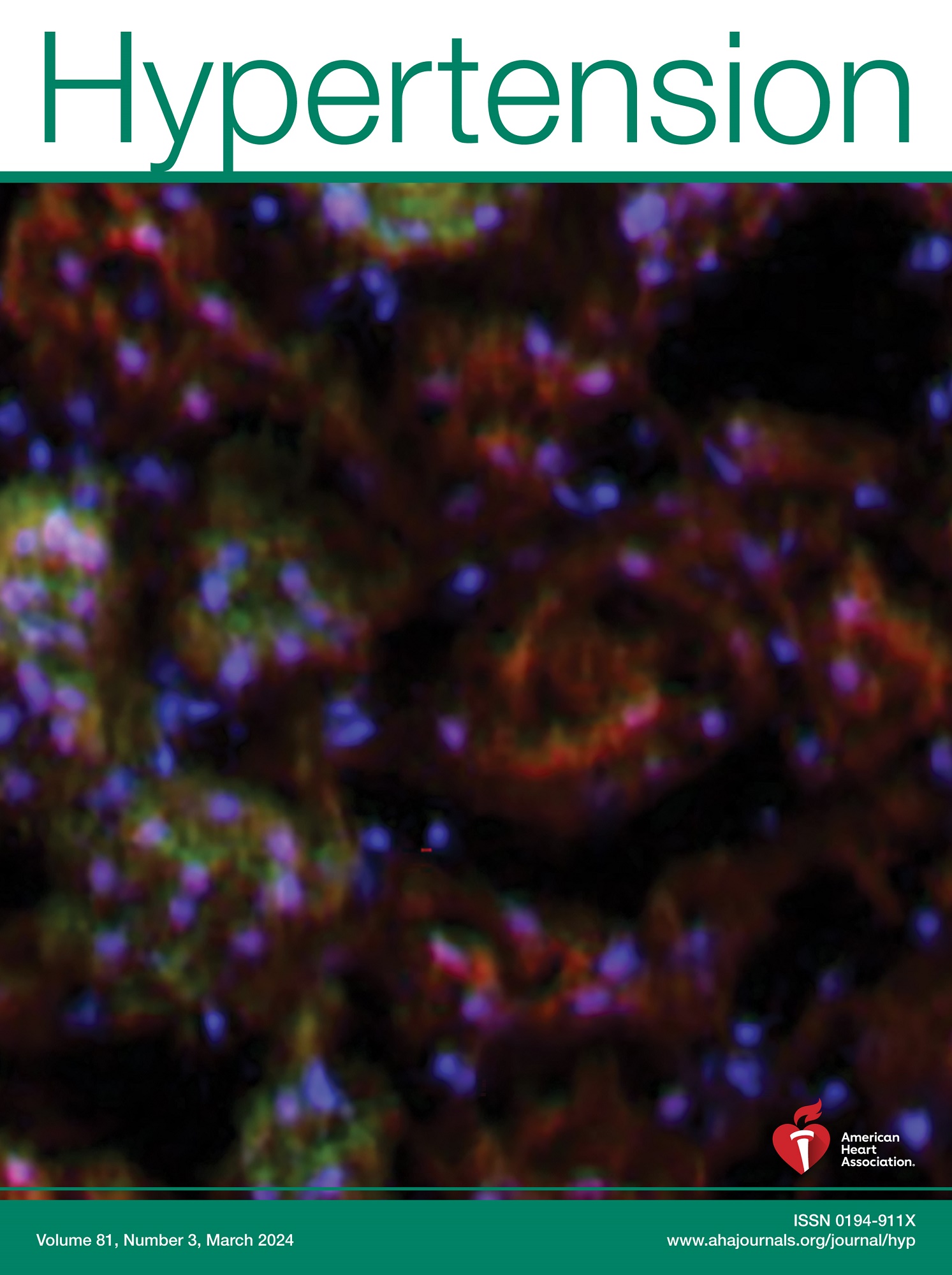诱导内皮细胞Gch1缺失对血压和妊娠结局的快速、性别特异性影响
IF 8.2
1区 医学
Q1 PERIPHERAL VASCULAR DISEASE
引用次数: 0
摘要
背景:四氢生物蝶呤(BH4)是内皮型一氧化氮合酶的重要辅助因子。构成性内皮BH4缺乏导致轻度高血压和血管功能障碍,可通过替代内皮来源的血管扩张剂部分补偿。因此,我们建立了一种新的VE-Cadherin-CreERT2 (VE-Cad-Cre)小鼠来评估在成年动物中诱导内皮特异性BH4缺乏的影响,而不需要发育或其他适应机制的潜在缓解作用。方法他莫昔芬诱导Gch1fl/flVE-Cad-Cre成年雌雄小鼠内皮细胞Gch1缺失和BH4缺失。在雌性小鼠中,内皮细胞BH4缺乏也在怀孕前立即引起。测定了诱导性Gch1缺失对BH4水平、血管功能、血压和妊娠期间胎儿发育的影响。结果雌雄Gch1fl/flVE-Cad-Cre小鼠血压正常。然而,他莫昔芬治疗雄性Gch1fl/flVE-Cad-Cre小鼠引起进行性高血压,并伴有一氧化氮合酶介导的血管舒张功能受损。他莫昔芬治疗雌性Gch1fl/flVE-Cad-Cre小鼠导致非进行性高血压,妊娠加重,导致子宫胎盘血管功能受损和胎儿生长受限。结论内皮细胞BH4缺乏的诱导揭示了血管功能、血压和心血管对妊娠反应中内皮细胞BH4的快速、性别特异性需求。这些变化比构成性内皮细胞BH4缺乏症更为显著,这表明发育或其他适应性作用未能减轻诱导性内皮细胞BH4缺乏症的影响。靶向内皮BH4生物利用度可能为获得性高血压疾病和胎儿生长受限提供治疗策略。本文章由计算机程序翻译,如有差异,请以英文原文为准。
Inducible Endothelial Gch1 Deletion Reveals Rapid, Sex-Specific Effects on Blood Pressure and Pregnancy Outcomes.
BACKGROUND
Tetrahydrobiopterin (BH4) is an essential cofactor for endothelial nitric oxide synthase. Constitutive endothelial BH4 deficiency leads to mild hypertension and vascular dysfunction that are partly compensated by alternative endothelium-derived vasodilators. Accordingly, we generated a novel VE-Cadherin-CreERT2 (VE-Cad-Cre) mouse to evaluate the impact of inducing endothelial-specific BH4 deficiency in adult animals, without the potential mitigating effects of developmental or other adaptive mechanisms.
METHODS
Endothelial Gch1 deletion and BH4 deficiency were induced by tamoxifen administration to Gch1fl/flVE-Cad-Cre male and female adult mice. In female mice, endothelial BH4 deficiency was also induced immediately before pregnancy. The effects of inducible Gch1 deletion were determined on BH4 levels, vascular function, blood pressure, and fetal development during pregnancy.
RESULTS
Male and female Gch1fl/flVE-Cad-Cre mice had normal blood pressure. However, tamoxifen treatment of male Gch1fl/flVE-Cad-Cre mice caused progressive hypertension with impaired nitric oxide synthase-mediated vasodilation. Tamoxifen treatment of female Gch1fl/flVE-Cad-Cre mice led to nonprogressive hypertension that was exacerbated by pregnancy, leading to impaired uteroplacental vascular function and fetal growth restriction.
CONCLUSIONS
Induction of endothelial cell BH4 deficiency reveals rapid, sex-specific requirements for endothelial cell BH4 in vascular function and blood pressure, and the cardiovascular response to pregnancy. These changes are more striking than those reported for constitutive endothelial cell BH4 deficiency, suggesting a role for developmental or other adaptive effects that fail to mitigate the effects of inducible endothelial cell BH4 deficiency. Targeting endothelial BH4 bioavailability may offer therapeutic strategies for acquired hypertensive disorders and fetal growth restriction.
求助全文
通过发布文献求助,成功后即可免费获取论文全文。
去求助
来源期刊

Hypertension
医学-外周血管病
CiteScore
15.90
自引率
4.80%
发文量
1006
审稿时长
1 months
期刊介绍:
Hypertension presents top-tier articles on high blood pressure in each monthly release. These articles delve into basic science, clinical treatment, and prevention of hypertension and associated cardiovascular, metabolic, and renal conditions. Renowned for their lasting significance, these papers contribute to advancing our understanding and management of hypertension-related issues.
 求助内容:
求助内容: 应助结果提醒方式:
应助结果提醒方式:


